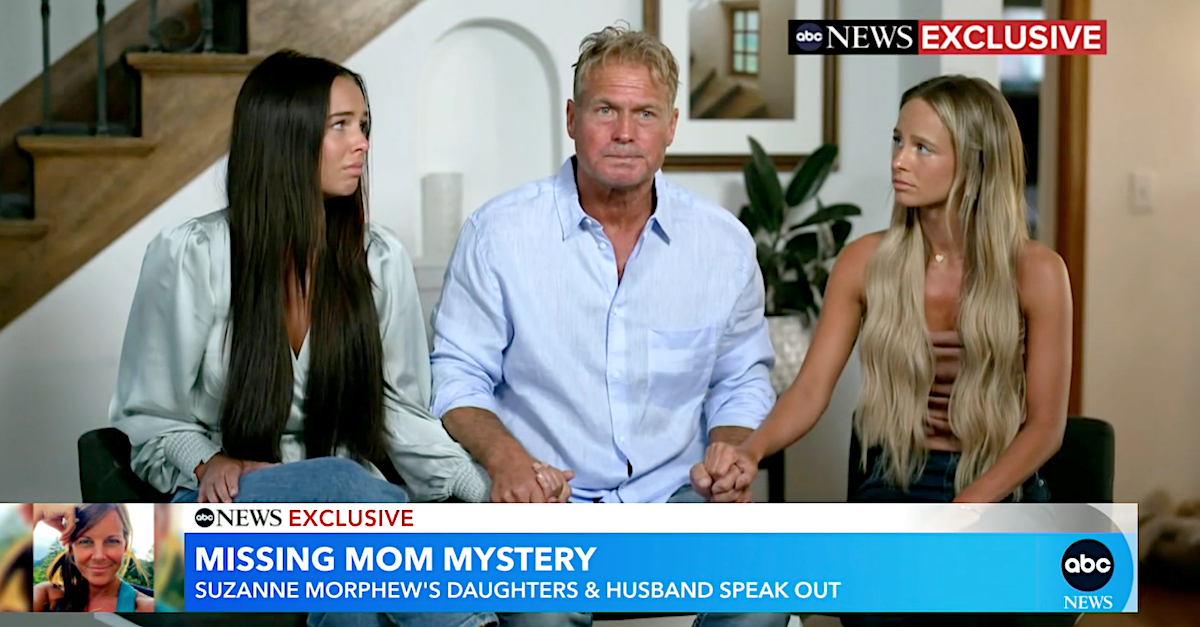
Macy, Barry, and Mallory Morphew spoke exclusively to ABC News in an interview broadcast on May 6, 2022. (Image via screengrab.)
The Colorado husband accused by local prosecutors of murdering his wife Suzanne Morphew said in an exclusive ABC News interview on Friday morning that he hopes his wife will someday be found.
“I just love my girls, and I love my wife,” Barry Morphew said. “And I just want her to be found.”
Morphew’s daughters appeared by their father’s side for the Good Morning America interview.
“We just know our dad better than anyone else and we know he was not involved in our mom’s disappearance,” Mallory Morphew said as her sister Macy nodded in agreement.
“These last few years have been the most painful thing that we’ve ever experienced,” Mallory continued. “We just miss our mom so much and we want her to be found.”
Mallory said it was a “blessing” that the family could finally start to heal from the loss of Suzanne — even aftrer prosecutors
“It’s been such an emotional rollercoaster and just traumatizing,” Macy Morphew echoed.
The family then spoke in unison to criticize the district attorney’s office for the way it handled the case.
“I just hope that [the district attorney] will step up to the plate and do everything she can to find our mom because what they’ve done is not fair and we’re never going to stop looking for our mom,” Macy Morphew said in an emotional on-camera statement.
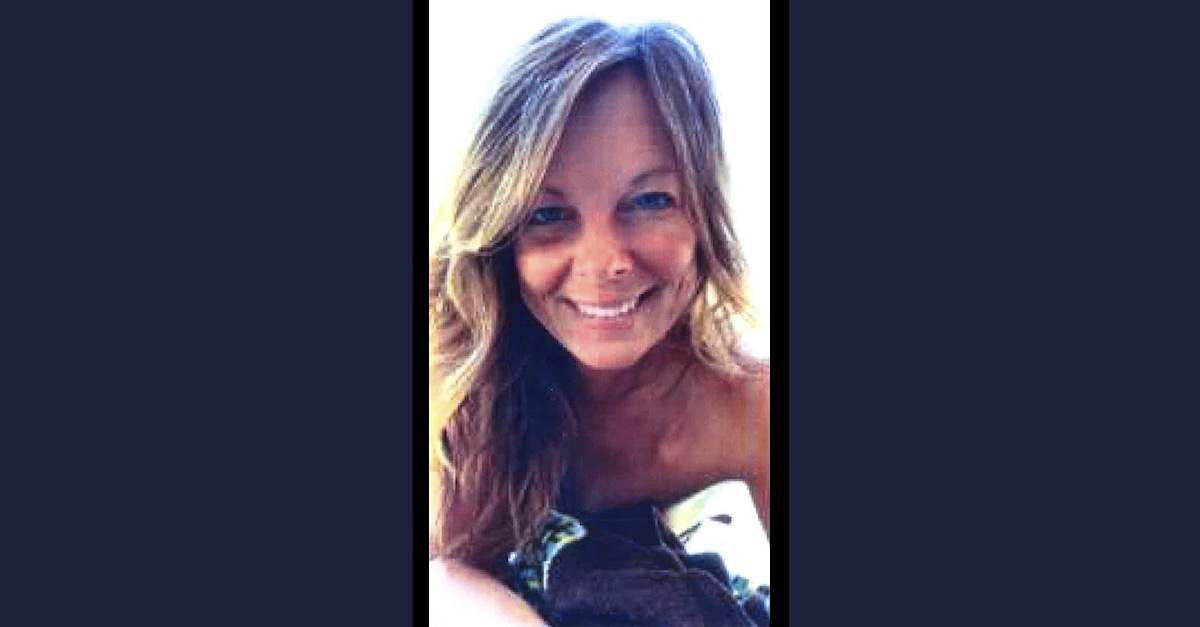
A prosecution evidence photo (exhibit 59) portrays an image of Suzanne Morphew dated May 9, 2020, at 2:03 p.m. It is alleged to be the last known photo of Suzanne Morphew alive. (Image via court records.)
Iris Eytan, Barry Morphew’s attorney, told ABC News that she is planning to file a complaint against the way the office of DA Linda Stanley handled the case.
“Prosecutors need to be held responsible, and they need to pay for the damage they’ve caused to Barry, which is, frankly, nearly irreparable at this point, because it’s hard for anybody to believe that Barry is not who they claim he was,” Eytan told the morning news program.
“If you want to honor Suzanne, and you want to honor the daughters, go find Suzanne,” she publicly told prosecutors.
Text messages Suzanne Morphew sent to a friend before she died suggested that Suzanne believed Barry was dragging one of the couple’s daughters into the troubled relationship between the husband and wife. The messages also suggested that Suzanne believed Barry was manipulating at least one of the girls to stay on his side. If ABC News asked about those messages, the answers did not appear in the broadcast version or the online version of the story.
“He’s not stable,” Suzanne wrote in an apparent reference to Barry. “It’s guilt and desperate measures he’s taking.”
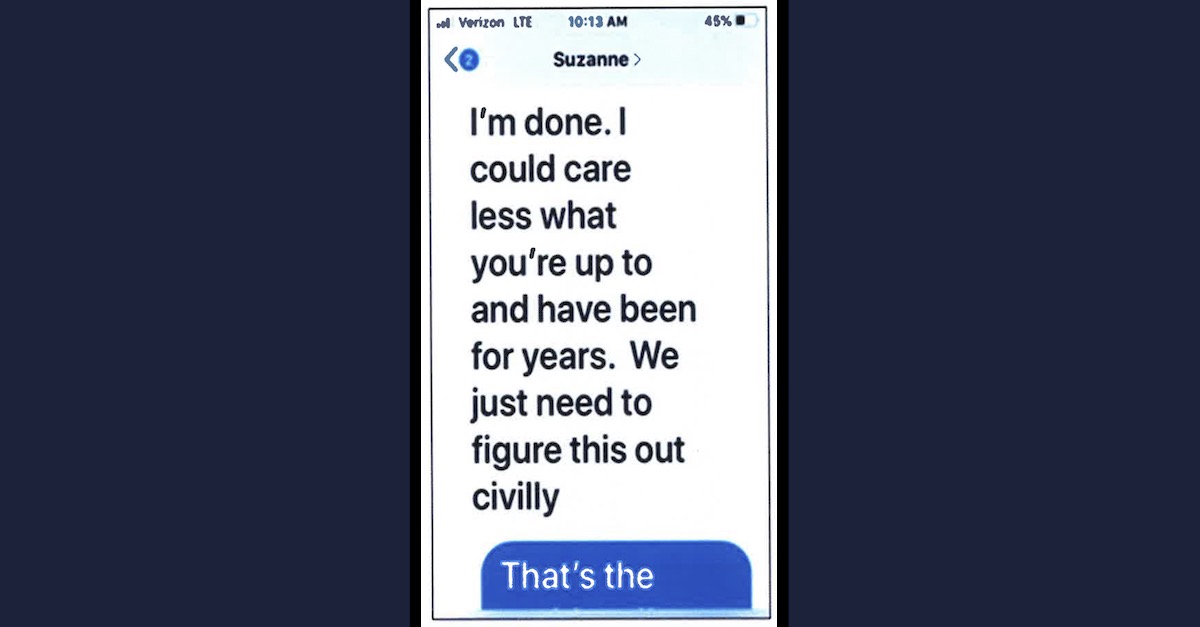
Prosecution exhibit 54 depicts a deleted-but-recovered text message from Suzanne to Barry Morphew. (Image via court records.)
Suzanne also appears to have written that her daughter Macy “knows more than she should” about the couple’s troubles.
“My heart is aching for what he did today,” Suzanne continued in a message to her friend while referencing one of her daughters. “She and I had a peaceful fun week. He came in and wrecked it and left making her feel bad for him. It’s sick. He looks for any reason to run. It can be small and he blows up and takes off . . . I believe there’s still another” (ellipses in original).
The meaning of “another” is unclear from the context, but Barry Morphew was accused of having an “intimate” relationship with another woman as the investigation unraveled. That woman denied the claims but was arrested for allegedly trespassing on the Morphew family’s former property; the charges were eventually dropped.
Investigators revealed during a pretrial hearing that Suzanne had been having an affair with a friend from high school for about two years before she disappeared. They alleged that Barry murdered Suzanne and pointed to the affair as a possible motive.
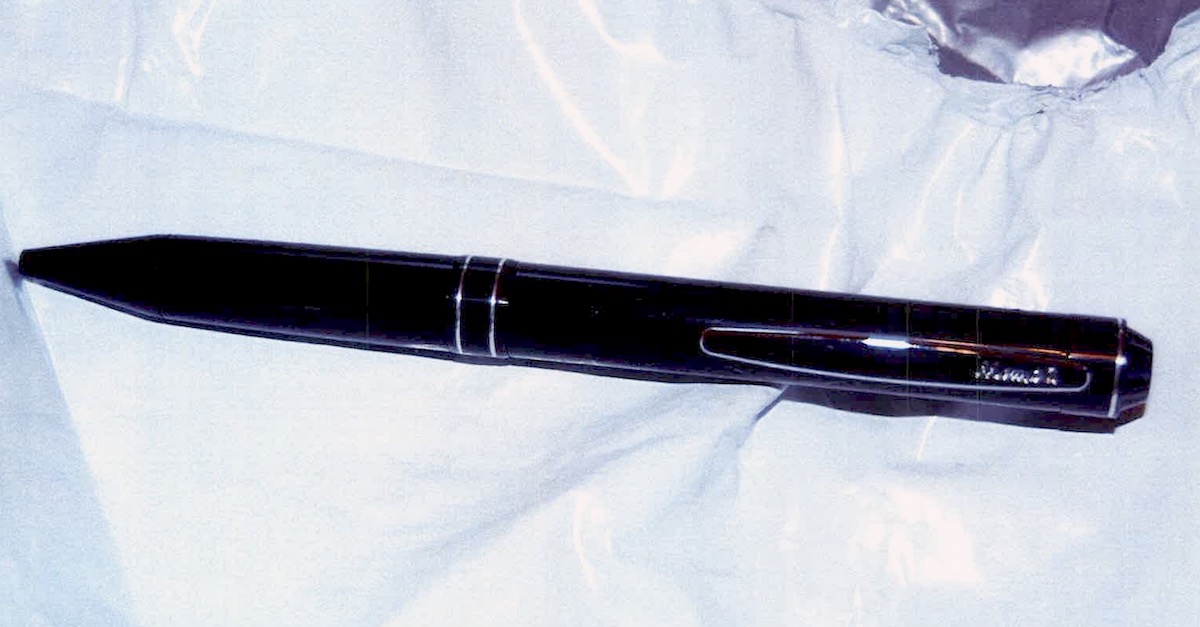
State’s exhibit 67 shows a spy pen that allegedly recorded conversations between Suzanne Morphew and a man with whom she was having an affair. (Image via court records.)
Suzanne disappeared on Mother’s Day in 2020 while on a bicycle ride. Suzanne’s bicycle was recovered, but Suzanne has never been found. Prosecutors chose to drop their case against Barry Morphew after a Colorado trial court judge blocked the state from presenting scads of evidence in the matter.
As Law&Crime previously reported, Judge Patrick Murphy found probable cause to move the case forward against Morphew as of Sept. 17, 2021. However, Judge Ramsey Lama, who took over the case, later slammed the prosecution for what he called an “obvious and egregious violation” of one discovery protocol and other less serious violations. The violations resulted in Judge Lama’s decision to axe significant portions of the state’s evidence. The court-ordered rubbishing of that evidence led prosecutors to fold: they asked to dismiss the case without prejudice, meaning they could refile it again sometime down the road.
The most serious violation, Judge Lama wrote recently, surrounded the state’s lack of candor regarding a CODIS match to a possible unknown suspect’s DNA. CODIS is a federal database that contains DNA evidence connected to criminal activity nationwide.
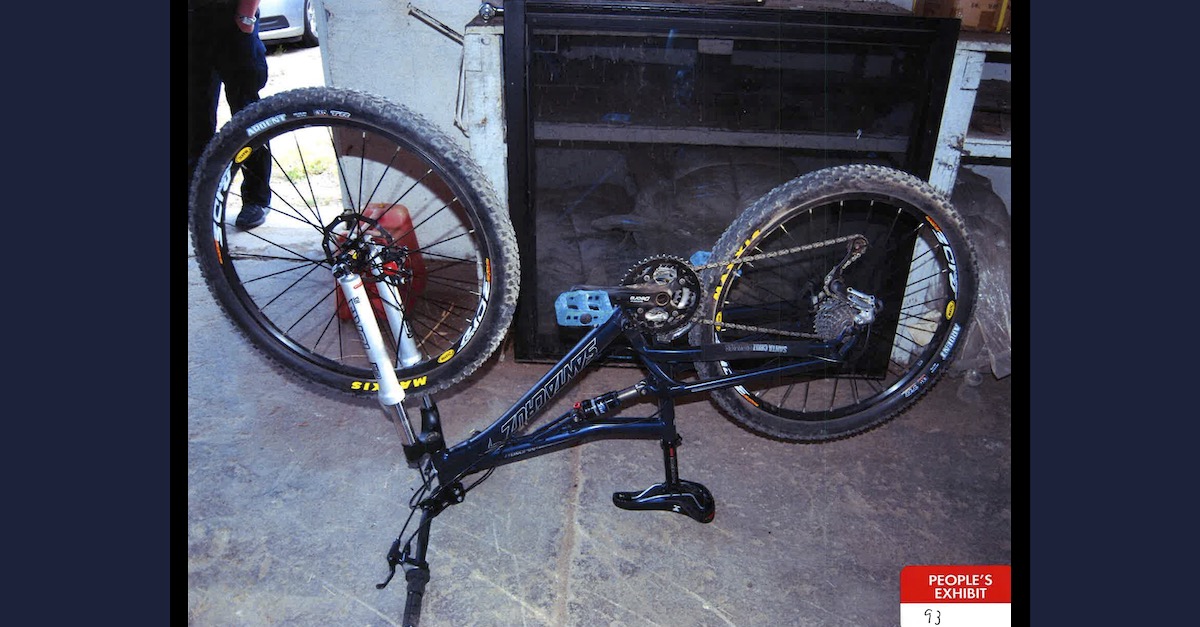
State’s evidence photo 93 shows Suzanne Morphew’s bicycle. (Image via court records.0
The Colorado Bureau of Investigation (CBI) found what Judge Lama referred to as “unknown male DNA . . . on various items of the crime scene: the interior cushion of [Suzanne’s] bike helmet, Mrs. Morphew’s bike, the glovebox and back seat of Mrs. Morphew’s Range Rover.”
“Mr. Morphew, along with other investigative personnel working the scene, were excluded as the source of the sample,” the judge continued. Rather, “the unknown male DNA partially matched DNA found in three out-of-state unsolved sexual assault investigations: Tempe, Phoenix, and Chicago.”
The presence of the DNA connected with other crimes in disparate jurisdictions would have given Barry Morphew a strong defense at trial: someone else did it; we just don’t know who he is because his DNA was never attached to a name.
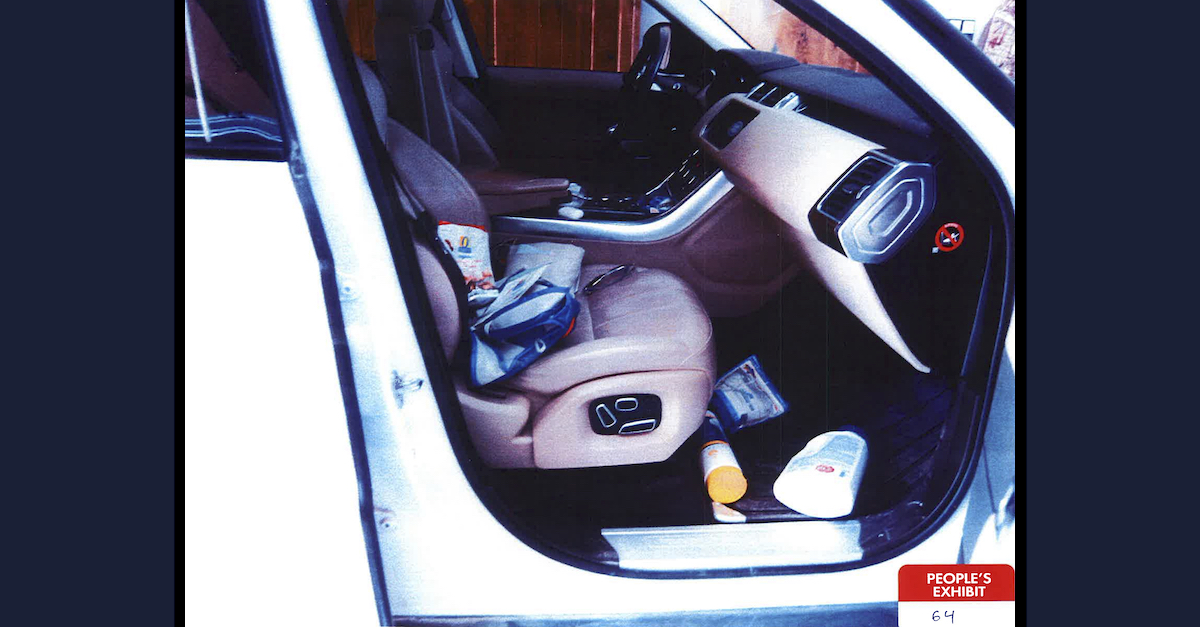
Evidence photo 64 shows the interior of Suzanne Morphew’s car. (Image via court records.)
According to subsequent court filings, Judge Murphy appears to have been unaware of the unknown DNA when he signed off on the arrest papers for Barry Morphew. Law enforcement officers took Morphew into custody on May 5, 2021. It was two weeks later, on May 19, 2021, that the state turned the CODIS data over to the defense.
Judge Lama said the state struggled to figure out how to deal with the unknown DNA and instead focused on hiding its validity or relevance. Here’s how the judge explained the issue:
In the months leading up to and during the Preliminary Hearing, the prosecution had three meetings with law enforcement and CBI analysts to discuss the meaning of the CODIS match, its significance, and follow up investigation to rule out potential sources of the DNA. Information tending to negate the guilt of accused was discussed, but nothing was reduced to writing and disclosed to the defense in any of the three meetings. The Preliminary Hearing commenced on August 9, 2021 and lasted four days. The People called the following witnesses: Alex Walker, Kenneth Harris, Jonathan Grusing, Derek Graham, Andy Rohrich, and Kevin Koback. The People did not elicit any testimony concerning the foreign male DNA from any of these witnesses. The defense ultimately called Agent Cahill of CBI to present the information to the Court.
Eventually, Judge Lama cited Judge Murphy’s eventual rationing that the unknown DNA was “particularly significant because while it doesn’t prove a stranger abduction theory, it does at least support it.” Therefore, because the unknown DNA pointed to a key weakness in the state’s case, Judge Murphy allowed Barry Morphew to go free on bond after he had been jailed without bond for about five months.
Morphew’s defense moved multiple times for discovery and contempt sanctions — and to dismiss the case.
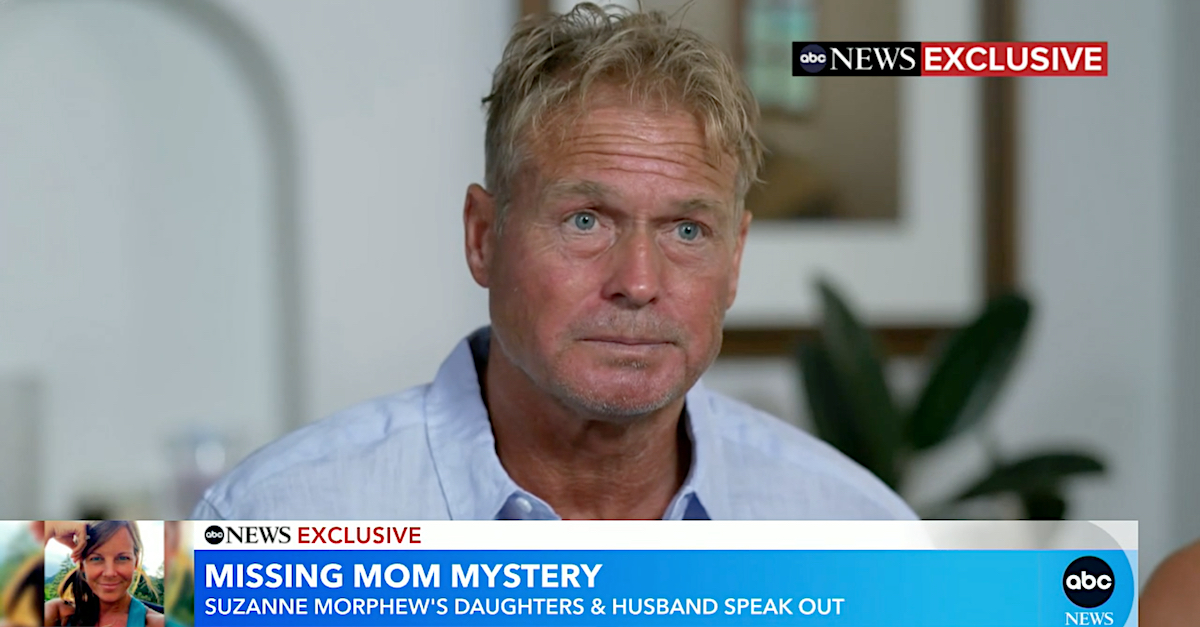
Barry Morphew. (Image via ABC News screengrab.)
Judge Lama initially refused to toss the case; rather, he said he would limit expert testimony about cell phone data, vehicle movement data, and the aforementioned DNA — in part because prosecutors filed information about expert witnesses too late in the process and missed important deadlines that are designed to give Morphew the ability to rebut the case the state was building against him.
Court papers revealed significant infighting between state and local authorities about whether — and how quickly – Barry Morphew should be placed under arrest.
Though prosecutors successfully asked to dismiss the case, they insinuated in court filings that they believe they know where Suzanne Morphew’s body may be found:
Throughout the pendency of this case, the People and law enforcement have been unrelenting in our search for Ms. Morphew. For some time, a single location has been the target of ongoing investigation. For the reasons expressed below, the People have a good faith reason to believe further investigation into this matter is essential to answering the most consequential question presented by this case. As this search cannot be accomplished in the coming weeks due to weather and snowpack conditions, the People respectfully ask this Court to dismiss the current indictment against the Defendant without prejudice.
The motion to dismiss continued:
As an offer of proof, the People and law enforcement believe we are close to discovering the victim’s body. The People were hopeful that the search for, and the discovery of, the victim’s body would be concluded well before trial, but weather has complicated the efforts. Specifically, the area law enforcement has been focused on is in a remote and mountainous region nearby the Morphew residence. This area received a significant amount of snow over the winter months before a search could be completed. To date, the area has 5 feet of snow concealing the location where the People believe Ms. Morphew is located. As a result, the People cannot safely excavate this area and resolve this unanswered question.
[images as noted]